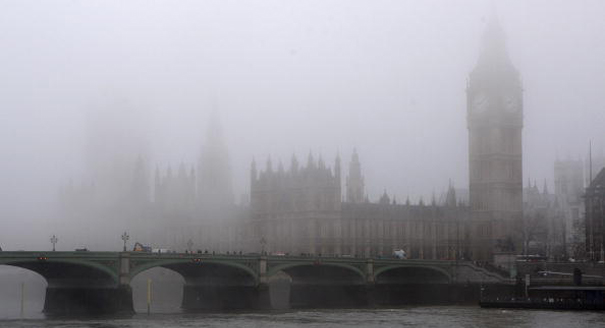A great fog has descended on the Brexit debate in Britain. Various people claim to be able to see through it, but in truth, nobody outside the highest reaches of government can; and the fog may well have engulfed them, too.
The fog has hidden two big questions from view. As a result, there is no agreement about the answers. The first is what the government’s plans are for the coming negotiations on Britain’s withdrawal from the EU following the June 23 vote. When asked about this, Theresa May, the prime minister, and David Davis, the Brexit secretary, say simply that “Brexit means Brexit,” there will be no “running commentary” on Brexit discussions, and negotiators never get the best deal if they “reveal [their] hand prematurely.”
Politics, like nature, abhors a vacuum, so guesswork is rife—some of it prompted by some scrawled notes from a meeting in Downing Street captured by a press photographer with a long lens. However, observers have little idea how much ministers will compromise, if at all, on the UK’s powers to keep out new immigrants in order to have the best access to the EU’s markets for Britain’s manufacturers, service companies, and banks.
The second big question hidden by the fog is what the mandate from the June referendum really means. Pro-Brexit campaigners say voters want the UK to regain control over its own affairs, especially on immigration. Government ministers say the mandate was for Britain to remain internationalist but to widen its outlook from Europe to the whole world. Remainers say that nobody voted for the UK to become poorer, and that there is therefore no mandate for harsh new immigration rules that would cause Britain to be thrown out of the EU’s single market and companies and jobs to flee the country.
Here, the truth is not quite so opaque. Light can be thrown on how British voters regard the EU. Four opinion polls during and since the referendum campaign give clear pointers.
First, an Ipsos-Mori survey published before the vote found widespread misconceptions about the UK’s links to the EU. For example, Leave voters thought 20 percent of the UK population was made up of immigrants from the EU. In fact, it’s just 5 percent. As many as 84 percent of Britons believed the UK was one of the three biggest contributors to the EU’s budget. In fact, the UK is fourth, behind Germany, France, and Italy.
Second, much of the support for Brexit was driven by a wider loss of trust in elites. According to market research firm YouGov, the proportion of people who trusted business leaders was 55 percent among Remain voters but just 27 percent among Leave voters. The figures for other groups were as follows: economists were trusted by 63 percent of Remain voters and 21 percent of Leave voters; academics generally by 68 percent of Remainers and 26 percent of Leavers; and the Bank of England by 61 percent of Remainers and 19 percent of Leavers. As for politicians, distrust was almost universal, but among Leave voters, the trust figure—at 8 percent—was even lower than among Remain voters (22 percent).
Third, a survey on the day of the referendum commissioned by businessman and Conservative politician Lord Ashcroft found that almost half of Leave voters said their biggest reason for wanting Britain to quit the EU was “the principle that decisions about the UK should be taken in the UK.” One-third said their main motive was that leaving “offered the best chance for the UK to regain control over immigration and its own borders.”
Finally, very few people who wanted Brexit thought it would have any downside. A YouGov survey on the eve of the referendum showed that only 4 percent of Leave voters thought Brexit would damage Britain’s economy, only 5 percent believed the UK would suffer any loss of influence, and a mere 2 percent thought Brexit would be bad for jobs.
Taken together, these findings paint a clear picture. Much of the support for Brexit was driven by a distorted view of the present state of affairs, a deep suspicion of elites and experts, a passion for the UK to assert its independence, especially on immigration, and a belief that this would be a cost-free choice.
This raises the question: What will happen if public perceptions change during the Brexit negotiations? If the budgetary savings of leaving turn out to be far smaller than the £350 million ($443 million) a week promised by the Leave campaign, that may wreck Leavers’ other big promise: a huge injection of cash for Britain’s National Health Service. Similarly, it may become clear that the UK won’t have complete control over immigration following the country’s departure from the EU. And it may turn out that a painful trade-off will be needed, with jobs and growth suffering as the price of Brexit.
If any or all of these things happen, public attitudes may change. Many of the people who voted for Brexit are out-and-out nationalists, who will doubtless stick to their views, even if they come to think there will be an economic cost to leaving the EU. But others have a more instrumental view: their support for Brexit in the referendum was driven by a belief that it would be good for jobs, investment, spending on public services, and their own families’ living standards.
One of the keys to the UK’s domestic politics over the coming years will be the views of these instrumentalists. If they continue to have faith in the practical consequences of Brexit, there will be nothing to stop the UK from leaving the EU. But if their faith frays, opinion polls could start to report a majority of Britons wanting to stay in the EU after all. What then? Eventually the fog must begin to clear; but nobody can be sure when—or what will happen when it does.
Peter Kellner is a journalist, political commentator, and former president of YouGov.








